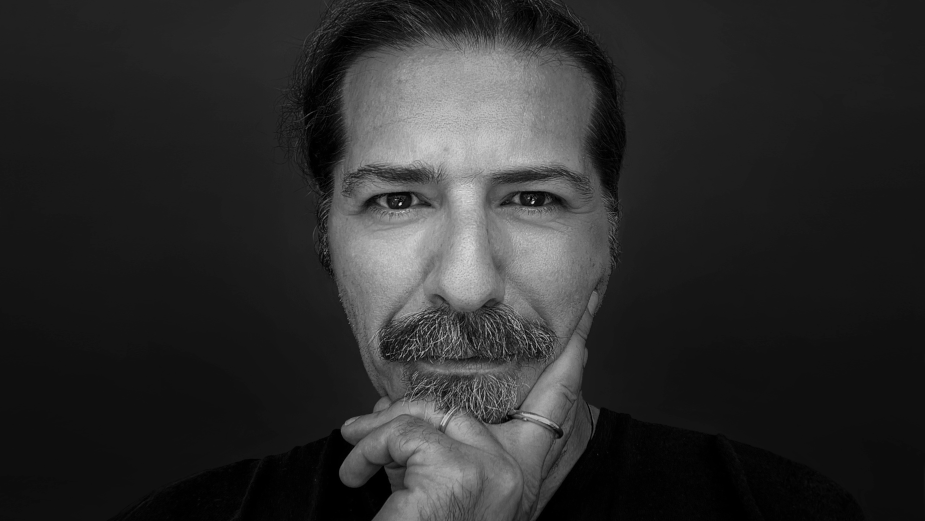
Joe Abou-Khaled: “Our Mission Is to Shed Light on Lebanon’s Progressive Flair as Means of Resistance against the Oppressor”

BIG KAHUNA FILMS, the award-winning creative production house based in Dubai and Beirut, is proud to support creativity across the Middle East. Over the coming months, as part of our sponsorship of LBB’s Middle East edition, we’ll be speaking to some of the great minds driving creativity forward across the region.
In this interview, LBB’s Natasha Patel caught up with Joe Abou-Khaled, regional ECD at BBDO Impact MENA who shared his story on growing up in Lebanon, the agency's partnership with newspaper AnNahar and why ‘creativity against collapse’ is an important mantra for him.
LBB> Tell us about your childhood in Lebanon - what did your early years look like and how much did creativity play a role in your life?
Joe> I grew up in Beirut. A city that has given so much blood, sweat and tears to become the pivotal point of creativity in the Middle East during the last part of the previous century. Home also played a big role in shaping and nurturing my own creativity, by providing the safety needed to overcome life’s obstacles and struggles. It was somehow the only way to find safety in a life punctuated by conflict.
I started drawing at a very young age and became the main illustrator at school for over a decade. The school’s journal became a platform to express my thoughts which helped me venture into comic books and satirical caricature; two mediums that perfectly balance verbal expression with visual language. That was my initiation to the communication world.
LBB> Growing up throughout a civil war must've impacted your outlook greatly, what are your thoughts on this?
Joe> In contradiction to what we were witnessing around us, the civil war has taught me altruism, humanity and tolerance. Since then, I knew that the only way out is to fight the status quo by adopting a positive attitude and channelling my talent towards something productive. It anchored my sense of belonging and resulted in an inherent obligation to positively impact society. Till today, this clarity in my objectives helps me define my battles and what the outcome of my efforts should entail.
LBB> At university you originally studied architecture, then switched to advertising. What made you change?
Joe> I knew from the beginning that I wanted to enrol in an art school, so ALBA (Académie Libanaise Des Beaux Arts) was the perfect fit for me, since it offered a two year preparatory program before choosing a major. I wanted to become an architect, but the University dean called upon me by the end of the first year and advised me to switch to advertising where he saw my true potential. That was back in the mid ‘90s where advertising in Lebanon was witnessing its golden age. A time when the agencies’ creative leaders bragged about their prowess in storytelling and insightful slogans which tickled and amused the crowd and launched the local brands in a country opening up to the world with a population trying to rebuild a nation after a 15-year civil war.
But still, Advertising and Marketing was a new profession that the older generation didn’t really understand or grasp. It was an educational period where the general public became familiar with the “modern” way of doing advertising. Award shows were broadcast live on prime television channels. It was the ‘sexy’ and ‘in-the-know’ field to venture into. So, I went all-in.
LBB> Working in a country such as Lebanon where creativity and culture play such a big part must mean adapting to many changes often. How do you get a sense of what's relevant in an ever-changing landscape?
Joe> Besides the fact that the world is constantly changing around us - which is part of its natural evolution, the pace that Lebanon is changing at, is as fast as the deterioration of its currency.
What we’re witnessing today in Lebanon is a catastrophic downfall of the system which is affecting people’s lives in every aspect. An amalgam of tension points that keep on draining the nation’s values and assets, but eventually become the main source of inspiration for problem-solving campaigns which resonate with the Lebanese every step of the way. These campaigns which are based on an urgency to act have been the main driving force for Lebanon’s creative work.
Most of the Lebanese today expect brands and campaigns to publicly commit to Corporate Social Responsibility values and stand with them against the repression imposed on them by their own government. Advertising campaigns can be powerful and instrumental in doing that, and we’ve seen brands embrace CSR as mainstream advertising.
LBB> Speaking of that, what is driving communications right now in Lebanon?
Joe> Purpose-driven brands. That is the key to enter people’s hearts and minds so they can take the necessary action. But besides the humane aspect of brands, humanism is driving communication right now in Lebanon. Real Stories and relatable actions are instrumental in opening the conversation.
The Next Big Thing in Beirut will not be the biggest non-nuclear explosion the world has ever seen, nor the world's worst financial crisis since the mid-19th century, as these two we already had. It will not be the most beautiful building in the world, nor the highest tower mankind has ever built. It also won’t be an NFT revolution in marketing nor a breakthrough in the Metaverse or any other form of web 3.0. The Next Big Thing in Beirut will be the creative boom and the innovative spirit of the Lebanese youth that are fighting relentlessly for their basic rights and daily necessities.
LBB> You've been at Impact BBDO for 20 years in Lebanon. What have been the biggest changes for Lebanon and the Middle East creatively in that time?
Joe> Lebanon is further defining its position as a creative hub and kitchen for the MENA region. And we at IMPACT BBDO are no strangers to that natural condition as we’ve been implementing this philosophy for a decade now. Servicing the network and consolidating regional businesses out of Beirut has helped us shape the business dynamics and the culture for the future of the company with a solid partnership between our offices across the network.
I have chosen to stay in Lebanon despite my regional role to provide support to the system that is in place today. Our Beirut office plays a primary role throughout the MEA region. This is in sync with the agency’s vision to service our clients across the network in the best way we can. The pandemic has also taught us all that geographies in business are obsolete once you bring together a pool of talent under a unified leadership and commitment. The region has grown significantly in the past 20 years and the work coming from its distant territories and diverse cultures is competing and winning against the most courageous campaigns from around the world.
LBB> The agency has a history of working on some incredible campaigns with AnNahar, talk us through this relationship and which pieces stood out to you?
Joe> Our ongoing engagement with AnNahar is a beautiful commitment from both client and agency to do work that goes beyond the pages of a newspaper. We have helped propel the brand on the international scene with bold campaigns that shook the general opinion and brought the voices of AnNahar readers to where they truly belong. It’s brand activism at its best. It stands in contrast to the usual business objectives of companies in supporting social causes for monetary reasons and sustainable profits. AnNahar’s engagement in the local cultural context stems from the core of its ‘raison d’être’ and mission.
Together, we operate with a dual objective of keeping the legacy of a 90-year-old journal alive while embracing a more consumer-centric approach which strives to give its readers a platform so they restore their stolen voice and claim their rights freely. AnNahar thrives to create positive, resilient and impactful relationships with the communities it mirrors. This is what we call engaged journalism.
Having a client that shares these values with us is a great partnership that engenders immortal ideas with powerful socio-political impact. The ‘Blank Edition’ succeeded in putting pressure to form a government. The ‘New National Anthem Edition’ anchored the place of women in the uprising, so it became the chant of the revolution. The ‘Innocent truth’ went on a quest in search of the August 4th truth through the children’s mouth, so we hold accountable those responsible for the deadly explosion. The issue highlighted the impact of the blast on Beirut children’s mental and physical health. The ‘Elections Edition’ was not sent to print that day. Instead, the ink and paper were donated to print ballots, showing the newspapers’ commitment to making the 2022 parliamentary elections happen on time.

LBB> You're working on something called 'creativity against collapse' - tell us more.
Joe> Creativity against collapse is a methodology that I implement in my work to empower the Lebanese community through advertising. It’s an ongoing invitation to engage the audience with honesty and positivity while championing innovation and talent against collapse and regression. Within this umbrella, we’ve done work for LBCI, the Baalbeck International Festival and AnNahar to name a few. Our mission is to shed light on Lebanon’s progressive flair as means of resistance against the oppressor. We adopt a bottom-up approach where the voice of the people is magnified to become the voice of the country.
It is also a doctrine that I follow with my team in Beirut to address the stagnation that we’re witnessing in Lebanon at the moment. We are working hard to minimise the brain drain and make sure the young generation still believes in the potential this country has to offer.
Therefore, our duty is to restore Lebanon’s core identity and image by putting it back on the global map where it rightfully belongs. By shedding light on the progressive and entrepreneurial spirit of the human Lebanese asset, we’re making an effort to remind the world that we’re still here.
The desired results will eventually make things better for both, the brand, and the target audience. Imagine if multiple brands collectively share similar objectives and beliefs, they can make a bigger noise and change the course of history. We’ve just seen that with the global brands boycotting Russia in solidarity with the Ukrainian people.
Steve Harrison in his latest book defined adland as ‘a sleeper cell secretly subverting the system from within’. I totally agree with him on that.
LBB> Away from work what does life look like for you?
Joe> I’m a husband and father of two toddlers who fill my life with joy. That is priceless. In my time away from work, I tend to spend every minute with the three of them.












